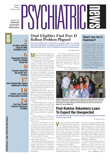A federal district judge in Manhattan denied a suit filed by the Medicare Rights Center and seven other groups that sought continuation of existing drug benefits for “dual eligibles” when they were switched from Medicaid drug coverage to the new Part D Medicare prescription drug program.
The suit was filed in December 2005 in anticipation of what advocacy groups were predicting would be a logistical disaster when 6 million dual eligibles—some 2.5 million of whom have mental illness—ceased having their prescriptions paid for by state Medicaid programs and began coverage under the new Medicare program.
But U.S. District Judge Loretta A. Preska said the court had no jurisdiction to order such a continuation of drug benefits when the anticipated problems were at the time theoretical and when there was a mechanism for individuals to seek redress under the Medicare Modernization Act of 2003 (MMA), the legislation that created the new program.
“The dual eligibles whose interests Plaintiffs seek to represent are, in effect, in no different a position from individuals entitled to receive non-MMA Medicare benefits,” the judge stated. “Any Medicare recipient runs the risk that he or she will seek medical services and, due to a glitch in a database, be informed, erroneously, that he or she is not in the system. The Medicare act does not contemplate that such an individual can file a complaint in federal court before even attempting to present a claim to the agency. It would be a wholesale subversion of the Medicare act's legislative intent to avoid overburdening the courts... if beneficiaries were able to bring federal cases where a simple phone call, e-mail, or letter might straighten out the problem. This rationale applies even more so where, as here, the alleged glitches are anticipated but have not yet occurred.”
The ruling was issued in the last week of December, just before the transition to the new program was to occur on January 1, and before many of the anticipated problems were reported nationwide (see
page 1).
The suit, filed against Health and Human Services Secretary Mike Leavitt, stated that he was “not taking adequate steps to meet his obligations under the statute” to ensure that dual eligibles transitioning into the new program would receive their necessary medications (Psychiatric News, December 16, 2005).
“Unless he does so, countless dual eligibles will fall through the cracks of this massive program transition; they will not be effectively transferred to new Medicare prescription drug coverage and may be left without needed prescription drug coverage on and after January 1, 2006,” the suit alleged. “Because many of these persons need prescription drug coverage to function or survive, the consequences of no longer receiving prescription drug coverage will be calamitous.”
The organizations that filed the suit are Action Alliance of Senior Citizens of Greater Philadelphia, Congress of California Seniors, Massachusetts Senior Action Council, National Alliance on Mental Illness: Maine, New York Statewide Senior Action Council, Coalition of Voluntary Mental Health Agencies Inc., United Senior Action of Indiana, and Medicare Rights Center.
The organizations are represented by volunteer attorneys with the law firm Paul, Weiss, Rifkind, Wharton, and Garrison L.L.P., and the Medicare Rights Center. They have indicated that they will appeal Preska's ruling.
“Nothing in this ruling suggests that the oldest, poorest, and frailest Americans are safe,” said Robert Hayes, president of the Medicare Rights Center, in a statement. “In the real world, people cut off from life-sustaining medicine cannot survive the delay of an agency appeal.”
The text of the court's decision in New York Statewide Senior Action, et al, v. Michael O. Leavitt, Secretary of the U.S. Department of Health and Human Services [05 Civ. 9549 (LAP)] is posted at<www.nysd.uscourts.gov/rulings/05CV09549_opinion_122905.pdf>.▪
